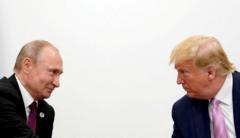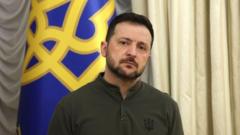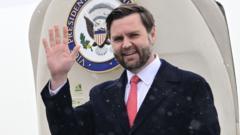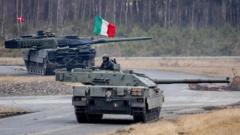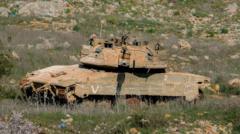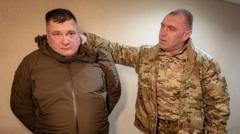With U.S. President Trump proposing ceasefire negotiations to end the conflict in Ukraine, the focus shifts to the role of European military forces in ensuring long-term peace and security in the region.**
European Forces Consideration for Ukraine's Post-War Security Amid Trump's Ceasefire Talks**

European Forces Consideration for Ukraine's Post-War Security Amid Trump's Ceasefire Talks**
The potential for European troop deployment in Ukraine emerges as a critical point in discussions surrounding a ceasefire agreement.**
The ongoing conflict in Ukraine raises pivotal questions about the future of European involvement in maintaining security once hostilities cease. Following U.S. President Donald Trump's announcement to pursue negotiations for a ceasefire, experts suggest that deterring a possible Russian resurgence could necessitate a major European military presence. Estimations indicate that as many as 150,000 troops may be required to stabilize Ukraine long-term, along with American backing for air support, intelligence gathering, and missile defense systems.
While President Trump appears keen on reducing American obligations in the region, analysts assert that he might look to Europe to take greater responsibility for Ukraine's defense. This sentiment marks a noticeable shift in strategy, as discussions normalize the inclusion of European "boots on the ground" for the specific purpose of implementing and monitoring a ceasefire agreement.
As attention turns to the annual Munich Security Conference, where U.S. officials, including Vice President JD Vance and Secretary of State Marco Rubio, will discuss these matters, the topic of troop deployment is expected to be a focal point. Various European nations, particularly from the Baltics, alongside France and Britain, have signaled a willingness to contribute troops to a potential peacekeeping force. However, the response from Germany underscores the complexities of the situation, as their officials deem the proposition of troop deployment as premature.
Ultimately, the discourse surrounding European military involvement in Ukraine will play a crucial role in shaping the region's security framework and preventing future aggression from Russia, all while navigating the intricate dynamics of international diplomacy. The viability of such troop contributions hinges on both European consensus and Russia's acceptance of any negotiated terms, making the coming weeks pivotal in defining Ukraine's post-war landscape.
While President Trump appears keen on reducing American obligations in the region, analysts assert that he might look to Europe to take greater responsibility for Ukraine's defense. This sentiment marks a noticeable shift in strategy, as discussions normalize the inclusion of European "boots on the ground" for the specific purpose of implementing and monitoring a ceasefire agreement.
As attention turns to the annual Munich Security Conference, where U.S. officials, including Vice President JD Vance and Secretary of State Marco Rubio, will discuss these matters, the topic of troop deployment is expected to be a focal point. Various European nations, particularly from the Baltics, alongside France and Britain, have signaled a willingness to contribute troops to a potential peacekeeping force. However, the response from Germany underscores the complexities of the situation, as their officials deem the proposition of troop deployment as premature.
Ultimately, the discourse surrounding European military involvement in Ukraine will play a crucial role in shaping the region's security framework and preventing future aggression from Russia, all while navigating the intricate dynamics of international diplomacy. The viability of such troop contributions hinges on both European consensus and Russia's acceptance of any negotiated terms, making the coming weeks pivotal in defining Ukraine's post-war landscape.

